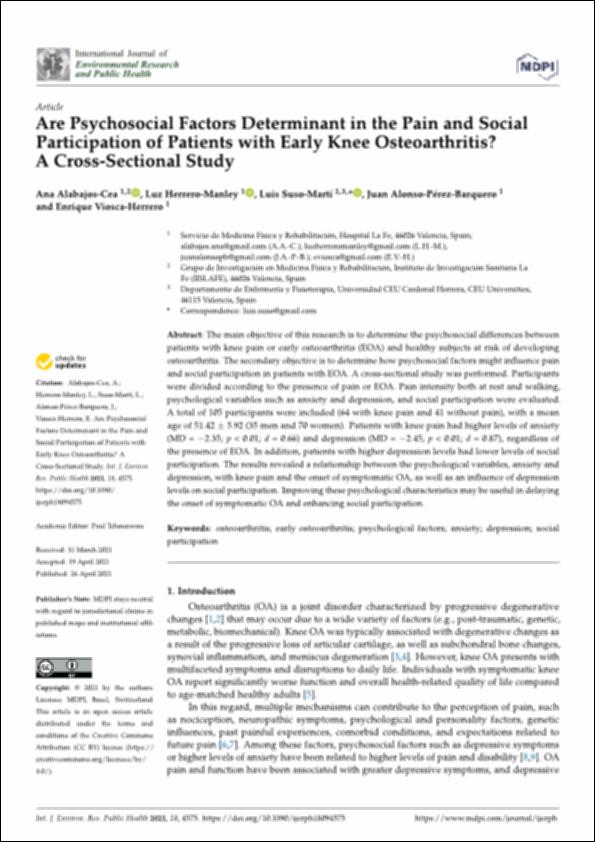Please use this identifier to cite or link to this item:
http://hdl.handle.net/10637/13657Are psychosocial factors determinant in the pain and social participation of patients with early knee osteoarthritis? : a cross-sectional study
| Title: | Are psychosocial factors determinant in the pain and social participation of patients with early knee osteoarthritis? : a cross-sectional study |
| Authors : | Alabajos Cea, Ana Herrero Manley, Luz Suso Martí, Luis Alonso Pérez-Barquero, Juan Viosca Herrero, Enrique |
| Keywords: | Dolor - Aspectos psicológicos.; Ansiedad - Aspectos psicosomáticos.; Osteoartritis - Aspectos psicosomáticos.; Depression, Mental - Psychocomatic aspects.; Pain - Psychological aspects.; Anxiety - Psychosomatic aspects.; Depresión mental - Aspectos psicosomáticos.; Osteoarthritis - Psychosomatic aspects. |
| Publisher: | MDPI |
| Citation: | Alabajos-Cea, A., Herrero-Manley, L., Suso-Martí, L., Alonso-Pérez-Barquero, J. & Viosca-Herrero, E. (2021). Are psychosocial factors determinant in the pain and social participation of patients with early knee osteoarthritis?: a cross-sectional study. International Journal of Environmental Research and Public Health, vol. 18, i. 9 (26 apr.), art. 4575. DOI: https://doi.org/10.3390/ijerph18094575 |
| Abstract: | The main objective of this research is to determine the psychosocial differences between patients with knee pain or early osteoarthritis (EOA) and healthy subjects at risk of developing osteoarthritis. The secondary objective is to determine how psychosocial factors might influence pain and social participation in patients with EOA. A cross-sectional study was performed. Participants were divided according to the presence of pain or EOA. Pain intensity both at rest and walking, psychological variables such as anxiety and depression, and social participation were evaluated. A total of 105 participants were included (64 with knee pain and 41 without pain), with a mean age of 51.42 5.92 (35 men and 70 women). Patients with knee pain had higher levels of anxiety (MD = 2.35; p < 0.01; d = 0.66) and depression (MD = 2.45; p < 0.01; d = 0.87), regardless of the presence of EOA. In addition, patients with higher depression levels had lower levels of social participation. The results revealed a relationship between the psychological variables, anxiety and depression, with knee pain and the onset of symptomatic OA, as well as an influence of depression levels on social participation. Improving these psychological characteristics may be useful in delaying the onset of symptomatic OA and enhancing social participation. |
| Description: | Este artículo se encuentra disponible en la siguiente URL: https://www.mdpi.com/1660-4601/18/9/4575 Este artículo pertenece a la sección "Health Behavior, Chronic Disease and Health Promotion". |
| URI: | http://hdl.handle.net/10637/13657 |
| Rights : | http://creativecommons.org/licenses/by/4.0/deed.es |
| ISSN: | 1660-4601 (Electrónico) |
| Issue Date: | 26-Apr-2021 |
| Center : | Universidad Cardenal Herrera-CEU |
| Appears in Collections: | Dpto. Enfermería y Fisioterapia |
Items in DSpace are protected by copyright, with all rights reserved, unless otherwise indicated.


